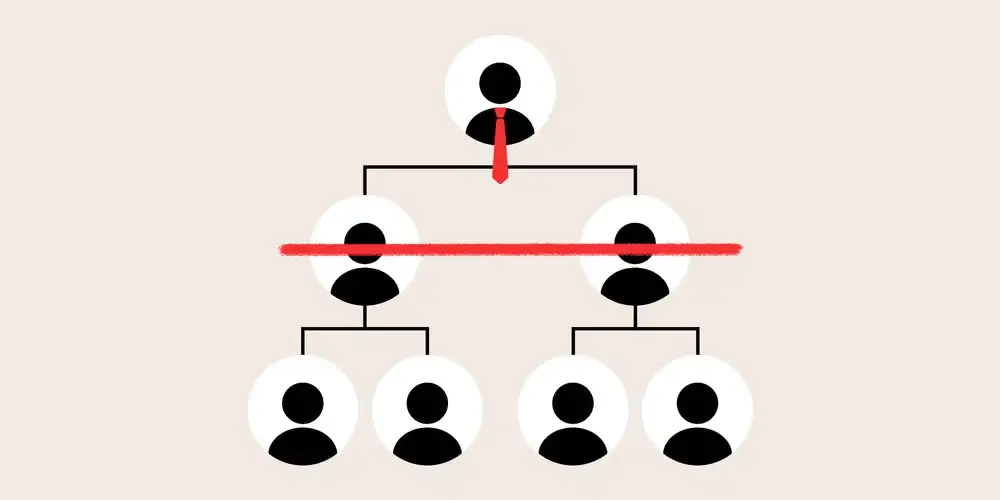
AI agent sắp xóa sổ sơ đồ tổ chức: Quản lý trung gian có thể biến mất hoàn toàn
-
Asha Sharma, Phó Chủ tịch phụ trách nền tảng AI của Microsoft, nhận định AI agent có thể khiến sơ đồ tổ chức (org chart) trở nên lỗi thời, nhường chỗ cho một “work chart” dựa trên luồng công việc thay vì cấp bậc.
-
AI agent sẽ giúp tự động phân phối nhiệm vụ đến đúng người hoặc tác nhân AI phù hợp, khiến hệ thống quản lý phân cấp trở nên không cần thiết.
-
Thay vì “báo cáo lên trên”, nhân viên sẽ tập trung vào xử lý công việc theo luồng nhiệm vụ (task-based), từ đó nâng cao hiệu suất và giảm tầng lớp quản lý.
-
Sharma đặt câu hỏi trọng tâm cho các doanh nghiệp tương lai: Làm sao để tự động phân công nhiệm vụ? Ai nên đảm nhận? Làm thế nào để đánh giá và điều chỉnh AI agent nếu thực hiện sai?
-
Nhân viên có thể mang theo “agent stack” cá nhân đến nơi làm việc – tương tự như BYOD (bring your own device) – để tăng cường kỹ năng và hiệu quả.
-
AI còn có thể thay đổi cách vận hành cuộc họp, khiến chúng “kỳ lạ hơn nhưng hiệu quả hơn”.
-
Các tập đoàn lớn như Microsoft, Google, Amazon đã bắt đầu xu hướng “phẳng hóa” doanh nghiệp bằng cách cắt giảm quản lý:
-
Microsoft sa thải 6.000 nhân viên vào tháng 5/2025, tăng “span of control” cho các quản lý.
-
Google cắt giảm 10% vị trí phó chủ tịch và quản lý năm 2024.
-
Amazon đẩy mạnh mô hình startup, giảm tầng lớp quản lý trung gian.
-
-
CEO Retool, David Hsu, cho biết nhiều khách hàng như BCG, AWS và Databricks đang tìm cách dùng LLM để thay thế lao động.
-
Một số công ty đã thử nghiệm AI agent làm quản lý trung gian: phân tích cuộc họp, gửi phản hồi hiệu suất, và thậm chí có doanh nghiệp xem xét loại bỏ hoàn toàn quản lý bán hàng vì AI phản hồi khách quan hơn.
📌 Phó Chủ tịch phụ trách nền tảng AI của Microsoft, nhận định AI agent có thể khiến sơ đồ tổ chức (org chart) trở nên lỗi thời, nhường chỗ cho một “work chart” dựa trên luồng công việc thay vì cấp bậc. AI agent sẽ giúp tự động phân phối nhiệm vụ đến đúng người hoặc tác nhân AI phù hợp, khiến hệ thống quản lý phân cấp trở nên không cần thiết. Thay vì “báo cáo lên trên”, nhân viên sẽ tập trung vào xử lý công việc theo luồng nhiệm vụ (task-based), từ đó nâng cao hiệu suất và giảm tầng lớp quản lý.
https://www.businessinsider.com/agents-kill-org-chart-microsoft-ai-product-lead-hierarchy-structure-2025-8
AI agents could make the org chart obsolete. Microsoft's AI product lead explains what might replace it.
- The rise of AI agents could kill the org chart, said Microsoft's AI platform product lead.
- "The org chart starts to become the work chart," Asha Sharma said.
- Big Tech is already cutting layers of management — and AI could accelerate the flattening.
The great flattening
Thảo luận
Follow Us
Tin phổ biến



